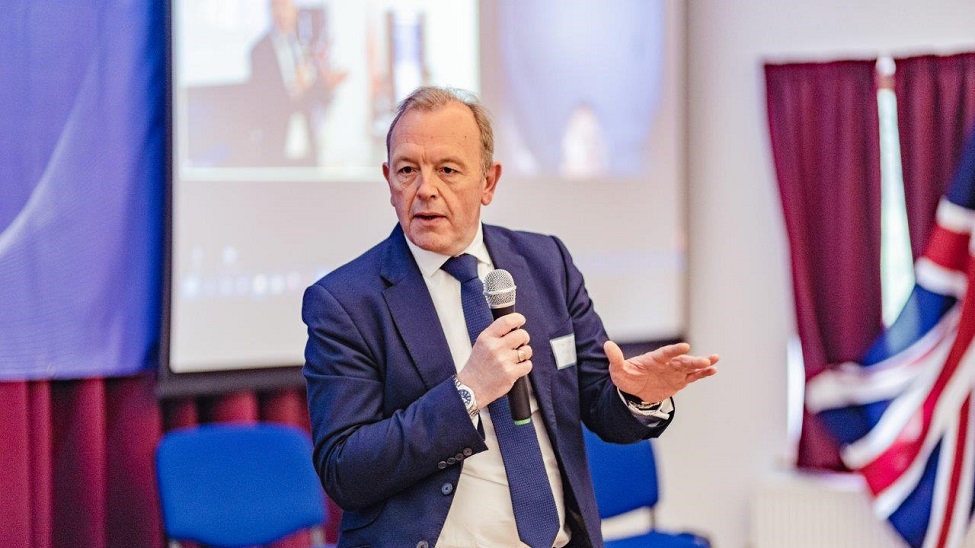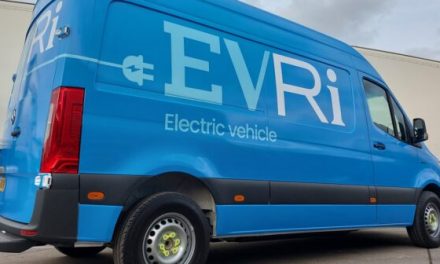
How AI Tech is transforming cross-border e-commerce trade

Post & Parcel caught up with Martyn Noble, CEO of Hurricane Commerce, a world-leader in AI tech that is enabling its customers to achieve speed, scale and compliance in cross-border e-commerce trade.
What have the last 12 months been like for Hurricane?
Hurricane has continued to go from strength to strength. This is due to several different parts of our business strategy coming to fruition.
We have now firmly established our position as the global leader in the provision of AI-driven tech to customers in the carrier and postal sector. In the case of posts, we now count over 25 national postal operators around the world as customers including Australia Post, Royal Mail, An Post, Hong Kong Post, New Zealand Post and, most recently, Canada Post.
How else is the company growing?
We are also well underway with our diversification into multiple other sectors, among them customs brokers, freight forwarders, airlines, retailers, marketplaces, as well as professional and financial services.
We are also increasing our work with governmental organisations, with a prime example of this being our selection to support a new 3-year research and innovation project PARSEC, funded by the EU’s Horizon program, to provide state-of-the-art compliance and regulatory data.
We have continued to innovate and evolve is our best-in-class AI tech, ensuring that we continue to set the standard and meet the requirements of our customers in all the sectors in which we now operate.
Additionally we are continuing to increase our presence in different geographic territories, but in a sensible and strategic way. This involves a combination of working with the right strategic partners in certain parts of the world while, in other locations, we have invested in the best talent, one example of this being the appointment of Laurie Cieciuch as our first ever Partnerships Director in the United States. Laurie has an extensive background working in senior roles in logistics and e-commerce including SEKO, IBC and the United States Postal Service.
How has the market changed since Hurricane was founded almost 8 years ago?
There have been so many changes in such a short space of time. When we started out the focus was very much on regulation and compliance and how they were likely to impact the conduct of cross-border e-commerce trade while, more recently, the emphasis has been on working with various organisations on customs border entry. This is paving the way for what is coming next which is the requirement for all global trade to be fully digitized and seamlessly linked.
This will include tax determination at the point of transaction, VAT revenue collection and fiscal flow. Customs will be about the digitization of compliance including illicit and counterfeit goods and falsely declared values on shipments.
At the core of all this is the need to get your data right at source, enabling the data to accompany the physical and fiscal flow of goods across borders for multiple stakeholders
How can Hurricane help the industry to be more productive?
Carriers, postal operators, freight forwarders, customs brokers, marketplaces and other players in the cross-border e-commerce ecosystem have the opportunity to seize a huge competitive advantage by harnessing the right tools, including true deep vertical AI tech, to simplify and streamline the lives of their customers, improve their own productivity and reduce total unit cost.
The requirement for speed and accuracy of data is not just about transportation. The tech that we have built at Hurricane is applicable both upstream and downstream whether that is tax reconciliation and auditing or responding to the increasing fragmentation of the world traditionally occupied by the posts and carriers but now opening up to the likes of the forwarders and brokers.
What is the current status of cross-border e-commerce?
B2C e-commerce has seen huge growth in recent years and was, of course, given a catalytic injection during the 2020/21 global pandemic.
That said, cross-border e-commerce remains highly buoyant. Consumers are now more confident than ever about purchasing products from overseas with global retail e-commerce sales currently in the region of $5.7trillion – around 22% of which are cross-border according to Statista. This figure is forecast to grow to over $8trillion by 2026.
Europe, North America, Latin America, Asia Pacific, the Middle East and Africa are all growing markets and, as such, offer rich hunting grounds for ambitious retailers and their logistics partners.
Tell us about Hurricane’s AI tech and how it differs from the everyday AI we read about in the news?
There has been a huge amount of hype surrounding AI in the last year or two with outlandish claims that it is the answer for everything.
It is important to take a step back. AI is not new, in fact the term ‘Artificial Intelligence’ was first coined in 1957 and its focus until the mid-1970s was to create a computer model of the human brain, something that has still yet to be achieved. In the last 30 years, the focus has been on deep learning with notable successes including the chess grandmaster Gary Kasparov losing to the Deep Blue computer.
When it comes to AI’s use in cross-border trade, you have to separate out the so-called Large Language Model (LLM) AIs, such as ChatGPT and GPT-4, and what we at Hurricane call true deep vertical AI.
How is Hurricane’s use of AI different?
LLMs are great at performing certain tasks such as drafting a job description for a Java developer, writing an Instagram post or even producing a 2,000-word essay on glacial destruction in Norway.
What they can’t get near is the functions performed by the vertical AI systems deployed by Hurricane, systems that have been tailored to address specific industry issues.
Hurricane’s true AI can deliver complete, accurate and scalable data in 100 milliseconds or less whereas LLMs will take minutes and won’t have anything like the same accuracy levels. Real-time processing is simply not an option.
As the AI pioneer Rodney Brooks said in May last year: “What the LLMs are good at is saying what an answer should sound like, which is different from what an answer should be.”
How do you feel about what Hurricane has achieved in terms of AI?
I am proud of the successes we have had in gaining recognition for the breadth and depth of our true deep vertical AI, the knowledge and expertise of our teams – what we call the ‘Hurricane Way’ – and the dialogue we are now having in so many different yet interconnected markets which is accelerating day by day.
What next for Hurricane’s AI?
Hurricane’s true AI systems have been almost eight years in the making and the breadth and depth of our tech’s capability continues to evolve. There will be new releases of Hurricane products this year and we are already working on product innovations for the next 3-5 years.
In recent months we have started to roll out our game-changing all-in-one Kona product, the first product of its kind in the world giving our customers the ability to access product classification, duty and tax calculation, prohibited and restricted goods screening and denied parties screening in one API call.
We have built a fantastic in-house team of the brightest and best technical talent who are continually pushing boundaries in terms of what is possible and, alongside this, we listen to our customers and work with them to shape our products to meet their specific challenges and opportunities. This is collaborative working at its very best.
Such collaboration is already seeing us working with customers and strategic partners to meet the requirements for complete, accurate and compliant data sets focused on emerging areas such as CO2 emissions, forced labour and product data within the circular economies.
Technologies like Blockchain will increasingly have an important role to play in helping to improve the transparency of data across the entire supply chain and a product’s individual life cycle.
How do you expect cross-border trade to change in the coming years?
I think the one certainty is that the pace of change will only accelerate with the cross-border landscape changing more in the next five years than in the previous five to ten years.
Data requirements and accompanying data sets will increase driven by national and regional governmental policy and the requirement for governmental taxation revenues to be collected quickly and effectively.
To enable the volume and load of data required, system architecture is improving all the time bringing with it enhancements in speed and scale. Hurricane is at the forefront of innovation in this space.
Governments are also modernising their policy approach and technical deployments with examples of this including the EU’s VAT in the Digital Age (VIDA) and the introduction of the Import One-Stop Shop (IOSS) a couple of years ago.
Both of these reforms are intended to ensure that VAT is collected fairly and efficiently for businesses that sell goods or services online to customers in the EU.
How can Hurricane help the industry to comply to the latest release of ICS2?
Later this year will also see the third release of Import Control System 2 (ICS2) and its requirement for complete and accurate advance electronic data (AED) including mandatory HS codes. In the US, the so-called STOP Act 2.0 may finally mean tougher enforcement of laws governing the importation of goods into that country.
Having built firm foundations in the last eight years, Hurricane is ready to enable our customers across all of the sectors in which we now operate to deploy our AI-driven tech in their pursuit of smooth customs flows and seamless cross-border e-commerce.
Martyn Noble
Martyn is CEO, Chairman and Co-Founder of Hurricane Commerce.
He was one of the six founders of Hurricane in 2016, established to provide its customers with a suite of AI-driven, real-time cross-border data solutions. Hurricane is private equity-backed and employs over 50 people located in the UK, Europe, Asia Pacific and North America.
Prior to setting up Hurricane, Martyn gained vast leadership experience in the corporate and venture capital sector. He has a proven track record of taking businesses from start-up to exit.













